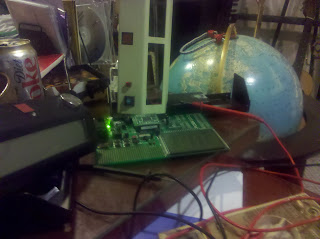
Chess is very similar. I pull the 32 pieces out of my rucksack and look at the familiar friendship I have had. Since it’s been several months since my last serious game, I play the familiar riffs in the form of tactical exercises or reviewing old familiar games. As I spar with silicon, I pull out my tried and true openings not daring to venture out of the comfort of my rote recall. I’ve offered to teach the neighbor girls who are just getting into scholastic chess. If I want to get back “into it” I need to form the calluses again by stretching beyond the comfort of rote memory.
My part time classes I teach are starting to wind down and I want to “join the band” again during the break. Like playing an instrument, playing chess regularly with the same people gives you a chance to tighten up your repertoire and build those calluses and get out of the comfortable rut.
Having been out of the tournaments for a little while gives me a chance to see how much I’ve lost. Right before I took a break, I had recently done a study in d-pawn openings. I want to see how much has stuck in terms of understanding the concepts. Sure, some of the ideas will have to be relearned, but I am also hoping some of the other misinterpretations and thought processes will be obvious and more made more clear. I am approaching this with new eyes.
So, given that I am still busy with life, jobs, my guitar and stuff, how do set goals for the next couple months and feel like I am going in the right direction?
I am going to make the best use of my previous encounter with Dan Heisman when I posted here :
http://blog.chess.com/Blunderprone/therersquos-always-a-silver-lining
My intent is that I need to keep this simple yet challenging enough to pull me out of the comfortable rote zone.
1) Thought Process: I need to keep the thought process simple and follow the AST method. ( Activity, Safety and Time management). I plan on playing practice games and look at where I failed in these simple ideas.
2) Criticality Assessment: This is the holy grail for me. The best way to do this is to play Blitz games and review my mistakes and understand them. This will also help me identify when I need to spend time on critical moves. I can check my openings with the book but I want to develop a sense on where I need to spend time on critical positions in these openings. Going over annotated games ( a lot of games) will form a good foundation. So I will probably blog about this study.
3) Tactics: need I say more.
I may dust myself off and play in the Harry Nelson Pillsbury Memorial … I haven’t missed it for a couple years and my chess pieces are gently weeping.
Though my time machine may be under construction, I may have found the right flux capacitor and soon will have a MAJOR announcement that will rock the chess world after the new year.

3 comments:
Great Post! As Always. Did Dan suggest some alternative to 1. d4 2. c4?
I applaud you for going to the Pilsbury Memorial tournament.
I've re-imposed my "self-ban" on internet chess. Ironically, USCF it seems has G/60 as both slow and fast-chess ratings; I would call that decision an accurate one as it seems to be the border between the two.
I don't think blitz games are that useful unless you want to learn a new opening, or at least learn all the cheesy "hope-chess" tactics in a new opening. I fall into the same ones more than once when I play blitz. (Isn't it more or less a rush to see who makes the first blunder? that's "the rush" as I see it.)
However, OTB I may not fall into these traps at all as I spend more time looking for opponents' plans.
Analyze your slow games, missed tactics, over a real board with no computer. Then go back to use the engine as a double-check. I would say that is the best way to improve.
It is too easy for a person to play a lot of blitz and "hand their games to Fritz" and expect to become stronger players that way. I think the way players improved before computers, that is probably the best way to improve. Of course, using a database is also convenient, but I don't think that it's the most important use of time.
Welcome back!
Post a Comment